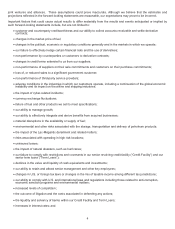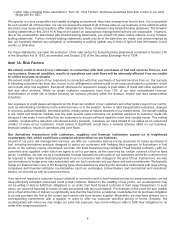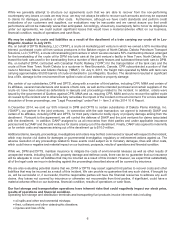World Fuel Services 2014 Annual Report Download - page 19
Download and view the complete annual report
Please find page 19 of the 2014 World Fuel Services annual report below. You can navigate through the pages in the report by either clicking on the pages listed below, or by using the keyword search tool below to find specific information within the annual report.14
on foreign earnings. Although we cannot predict whether or in what form any proposed legislation may pass, if enacted it could
have a material adverse impact on our income tax expense, financial condition, results of operations and cash flows.
Fluctuations in foreign exchange rates could materially affect our financial condition and results of operations.
The majority of our business transactions are denominated in U.S. dollars. In certain markets, however, payments to some
of our fuel suppliers and from some of our customers are denominated in local currency. We also have certain liabilities,
primarily for local operations, including income and transactional taxes, which are denominated in foreign currencies. This
subjects us to foreign currency exchange risk. Although we generally use hedging strategies to manage and minimize the
impact of foreign currency exchange risk when available, these hedges may be costly and at any given time, only a portion
of this risk may be hedged. Accordingly, our exposure to this risk may be substantial and fluctuations in foreign exchange
rates could adversely affect our profitability.
In addition, many of our customers are based outside of the U.S. and may be required to purchase U.S. dollars to pay for
our products and services. A rapid depreciation or devaluation in currency that affects our customers could have an adverse
effect on their operations and their ability to convert local currency to U.S. dollars in order to make required payments to us.
This could, in turn, increase our credit losses and adversely affect our business, financial condition, results of operations
and cash flows.
We face intense competition and, if we are not able to effectively compete in our markets, our revenues and profits
may decrease.
Competitive pressures in our markets could adversely affect our competitive position, leading to a possible loss of market
share or a decrease in prices, either of which could result in decreased revenues and profits. Our competitors are numerous,
ranging from large multinational corporations, which have significantly greater capital resources than we do, to relatively
small and specialized firms. In addition to competing with fuel resellers, we also compete with the major oil producers that
market fuel directly to the large commercial airlines, shipping companies and petroleum distributors. Although many major
oil companies have been divesting their downstream assets, some continue to compete with us in certain markets while
others may decide to reenter the market in the future. Our business could be adversely affected because of increased
competition from these oil companies, who may choose to increase their direct marketing in order to compete with us or
provide less advantageous price and credit terms to us than to our fuel reseller competitors.
Our cash equivalents and investments are subject to risks that may cause illiquidity and losses from declines in
value.
Our cash equivalents, principally consisting of overnight investments, bank money market accounts and bank time deposits
are subject to credit, liquidity, market and interest rate risk, which can be exacerbated by volatility in the capital markets.
Adverse changes in this respect can result in the decline of the fair value of our cash equivalents and therefore our liquidity,
which could materially affect our business, financial condition, results of operations and cash flows.
Current and proposed derivatives legislation and rulemaking could have a material adverse effect on our business.
The Dodd Frank Wall Street Transparency and Accountability Act of 2010 (the “Act”) provides for federal regulation of the
over the counter derivative markets both for commodities and securities, and gives the U.S. Commodity Futures Trading
Commission (“CFTC”) and the SEC broad authority to regulate such markets and its participants. This includes, among
others, derivative transactions linked to crude oil, refined products and natural gas prices. The CFTC and the SEC are
continuing to consider, finalize and implement rules governing, among other things, where swaps are transacted (on
exchange versus off exchange); how they are transacted (cleared versus uncleared; margined versus unmargined); the
differing responsibilities of those who participate in over the counter derivatives (end users, swap dealers, major swap
participants); and the application of cross border rules in the global derivatives markets. Further, regulations setting limits
on the size of a party’s derivative positions in major energy markets were adopted by the CFTC but vacated after a
successful challenge in federal court. In November 2013, the CFTC re-proposed new position limits rules, which would limit
trading in options, futures, and swaps contracts related to certain agricultural, metal, and energy commodities, including
energy commodities in which we currently engage in derivative transactions. Such rules have not been finalized, and we
cannot currently predict whether or when the re-proposed rules will be adopted or the effect of the final rules, if any, on our
businesses. Furthermore, certain of the other requirements under the Act have taken effect and other regulations that could
have a significant impact on us are expected to be finalized in the near future.
In addition, various foreign jurisdictions have adopted or are in the process of adopting legislation regulating the use of
derivatives, including Singapore and Europe, where we currently conduct certain derivatives related activities.
As regulations are finalized, adopted and implemented, we continue to evaluate how legislation will impact our ability to
conduct our business. In particular, the Act and any new (or newly implemented) regulations and international legislation
























